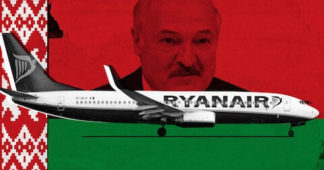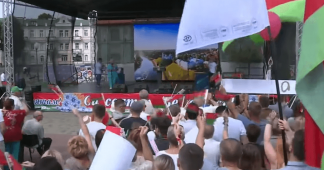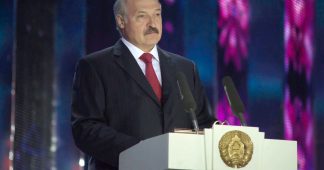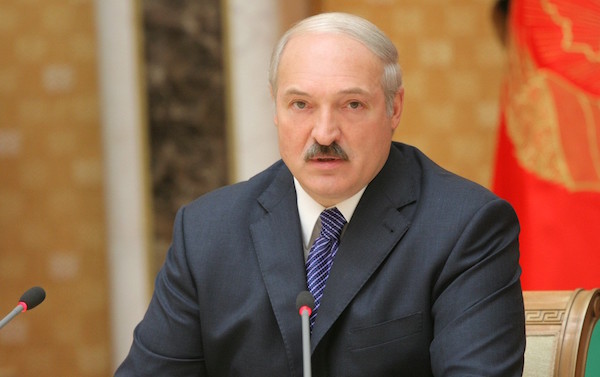By Glenn Greenwald, Glenn Greenwald’s Substack
24 May 21
What Belarus did, while illegal, is not unprecedented. The dangerous tactic was pioneered by the same U.S. and E.U. officials now righteously condemning it.
U.S. and E.U. governments are expressing outrage today over the forced landing by Belarus of a passenger jet flying over its airspace on its way to Lithuania. The Ryanair commercial jet, which took off from Athens and was carrying 171 passengers, was just a few miles from the Lithuanian border when a Belarusian MiG-29 fighter jet ordered the plane to make a U-turn and land in Minsk, the nation’s capital.
On board that Ryanair flight was a leading Belarusian opposition figure, 26-year-old Roman Protasevich, who, fearing arrest, had fled his country in 2019 to live in exile in neighboring Lithuania. The opposition figure had traveled to Athens to attend a conference on economics with Belarus’ primary opposition leader Svetlana Tikhanovskaya and was attempting to return home to Lithuania when the plane was forcibly diverted.
Protasevich, when he was teenager, became a dissident opposed to Belarus’ long-time authoritarian leader Aleksandr Lukashenko, and has only intensified his opposition in recent years. When Lukashenko last year was “re-elected” to his sixth term as president in a sham election, the largest and most sustained anti-Lukashenko protests in years erupted. Protasevich, even while in exile, was a leading oppositional voice, using an anti-Lukashenko channel on Telegram — one of the few remaining outlets dissidents have — to voice criticisms of the regime. For those activities, he was formally charged with various national security crimes, and then, last November, was placed on the official “terrorist list” by Belarus’ intelligence service (still called the “KGB” from its days as a Soviet republic).
Lukashenko’s own press service said the fighter jet was deployed on orders of the leader himself, telling the Ryanair pilot that they believed there was a bomb or other threat to the plane on board. When the plane landed in Minsk, an hours-long search was conducted and found no bomb or any other instrument that could endanger the plane’s safety, and the plane was then permitted to take off and land thirty minutes later at its intended destination in Lithuania. But two passengers were missing. Protasevich was quickly detained after the plane was forced to land in Minsk and is now in a Belarusian jail, where he faces a possible death sentence as a “terrorist” and/or a lengthy prison term for his alleged national security crimes. His girlfriend, traveling with him, was also detained despite facing no charges. Passengers on the flight say Protasevich began panicking when the pilot announced that the plane would land in Minsk, knowing that his fate was sealed and telling other passengers that he faces a death sentence.
Anger over this incident from American and European governments came swiftly and vehemently. “We strongly condemn the Lukashenko regime’s brazen and shocking act to divert a commercial flight and arrest a journalist,” U.S. Secretary of State Antony Blinken posted on Twitter on Sunday night, adding that U.S. officials “demand an international investigation and are coordinating with our partners on next steps.”
We strongly condemn the Lukashenka regime's brazen and shocking act to divert a commercial flight and arrest a journalist. We demand an international investigation and are coordinating with our partners on next steps. The United States stands with the people of Belarus.
— Secretary Antony Blinken (@SecBlinken) May 23, 2021
Because the E.U. includes as member states both the departing country of the flight (Greece) and its intended destination (Lithuania), and because Ryanair is based in another E.U. country (Ireland), its officials are expressing similar condemnations. EU Commission head Ursula von der Leyen denounced the forced landing as “outrageous and illegal behavior” and warned it “will have consequences”. The leaders of Lithuania and Ireland demanded serious retaliation and sanctions. It is unclear what retaliatory options are available given the strong international sanctions regime already imposed on Lukashenko and his allies.
There is little doubt that the forced landing of this plane by Belarus, with the clear intention to arrest Protasevich, is illegal under numerous conventions and treaties governing air space. Any forced landing of a jet carries dangers, and safe international air travel would be impossible if countries could force planes flying with permission over their air space to land in order to seize passengers who might be on board. This act by Belarus merits all the condemnation it is receiving.
Yet news accounts in the West which are depicting this incident as some sort of unprecedented assault on legal conventions governing air travel and basic decency observed by law-abiding nations are whitewashing history. Attempts from U.S. officials such as Blinken and E.U. bureaucrats in Brussels to cast the Belarusians’ behavior as some sort of rogue deviation unthinkable for any law-respecting democracy are particularly galling and deceitful.
In 2013, the U.S. and key E.U. states pioneered the tactic just used by Lukashenko. They did so as part of a failed scheme to detain and arrest the NSA whistleblower Edward Snowden. That incident at the time caused global shock and outrage precisely because, eight years ago, it was truly an unprecedented assault on the values and conventions they are now invoking to condemn Belarus.
In July of that year, the democratically elected President of Bolivia, Evo Morales, had traveled to Russia for a routine international conference attended by countries which export natural gas. At the time of Morales’ trip, Edward Snowden was in the middle of a bizarre five-week ordeal where he was stranded in the international transit zone of Sheremetyevo Airport in Moscow, unable to board a flight to leave Russia or exit the airport to enter Russia.
On June 23, Hong Kong officials rejected a demand from the U.S. Government that they arrest Snowden and hand him over to the U.S. Hong Kong was the city Snowden chose to meet the two journalists he had selected (one of whom was me) because of what he regarded as the city’s noble history of fighting against repression and for independence and free expression. When announcing their refusal to hand over Snowden, Hong Kong officials issued a remarkably defiant, even mocking statement explaining that Snowden had been permitted to leave Hong Kong “on his own accord.” That statement also accused the U.S. of having issued a legally improper and inaccurate extradition demand which they were duty-bound to reject, and then pointedly noted that the real crime requiring investigation was U.S. spying on the populations of the rest of the world.
Snowden thus left Hong Kong that day with the intent to fly to Moscow, then immediately board a flight to Cuba, and then proceed to his ultimate destination in a Latin American country — Bolivia or Ecuador — in order to seek asylum there. But even after then-President Barack Obama denied that the U.S. Government would be “wheeling and dealing” in order to get Snowden into U.S. custody — “I’m not going to be scrambling jets to get a 29-year-old hacker,” he dismissively claimed during a June press conference — the U.S. Government was, in reality, doing everything in its power to prevent Snowden from evading the clutches of the U.S. Government.
Led by then-Vice President Joe Biden, U.S. officials warned every country in both Europe and South America said to be considering shelter for Snowden of grave consequences should they offer asylum to the whistleblower. Threats to Havana caused the Cuban government to rescind its commitment of safe passage they had issued to Snowden’s lawyer. Under Biden’s pressure, Ecuador also reversed itself by proclaiming the safe passage document issued to Snowden was a mistake.
And on the day that Snowden had left Hong Kong, the U.S. State Department unilaterally cancelled his passport, which is why, upon landing in Moscow, he was barred from boarding his next international flight, destined for Havana. With the Russian government unable to allow him to board a flight due to his invalidated passport and with Snowden’s asylum requests pending both with Russia and close to two dozen other states, he was forced to remain in the airport until August 1, when Moscow finally granted him temporary asylum. He has lived there ever since. This has always been a staggering irony of the Snowden story: the primary attack on him by U.S. officials to impugn his motives and patriotism is that he lives in Russia and thus likely cooperated with Russian authorities (a claim for which no evidence has ever been presented), when the reality is that Snowden would have left Russia eight years ago after a 30-minute stay in its airport had U.S. officials not used a series of maneuvers that barred him from leaving.
(Obama’s claim to not care much about Snowden was issued at roughly the same time that the U.S. and U.K. governments were engaged in other extreme acts, including sending law enforcement agents into The Guardian‘s London newsroom to force them to physically destroy their computers used to store their copy of the Snowden archive, as well as detaining my husband, David Miranda, under a terrorism law at Heathrow Airport, with the advanced knowledge of the Obama administration).
While in Moscow, President Morales — on July 1, the day before he was scheduled to return to Bolivia — gave an interview to a local Russian outlet in which he said Bolivia would be open to the possibility of granting asylum to Snowden. The next day, Morales boarded Bolivia’s presidential jet to fly back to La Paz as scheduled, with a flight plan that including flying over several E.U. member states — including Austria, France, Spain, Italy and Portugal, as well as Poland and the Czech Republic — with a stop to refuel in Spain’s Canary Islands.
The Bolivian plane flew through Poland and the Czech Republic without incident. But flight records show that while flying over Austria toward France the plane suddenly took a sharp turn to the east, back to the Austrian capital of Vienna, where it made an unscheduled landing. Morales and his entourage were stranded there for twelve hours before re-boarding the plane and flying back to Bolivia.
Bolivian officials immediately announced that in mid-flight, they were told by France, Spain and Italy that their permission to fly over those countries’ air space had been rescinded. Without enough fuel to fly an alternative route, the Bolivian pilot was forced to make a U-turn and land in Vienna. Bolivian officials were told that the reason for the mid-air refusal of these E.U. countries to allow use of their airspace was because of assurances they were given by an unspecified foreign government that Snowden was on the plane with Morales, and that he was traveling because Bolivia had granted him asylum.
After Morales’ plane was forced to land at the Vienna airport, Austrian officials quickly announced that they had searched the plane and determined that Snowden was not on it. While Bolivia denied that they consented to any such search of the presidential plane, Bolivian officials angrily mocked the notion that Snowden would be secretly smuggled by Morales from Russia to Bolivia. The whole time this was happening, Snowden was in Moscow. Needless to say, had Snowden been on Morales’ plane that was forced to land in Vienna, Austrian officials would have instantly detained him and turned him over to the U.S., which had by then issued an international arrest warrant. The only reason Snowden did not suffer the same fate that day as the one Protasevich suffered on Sunday is because he happened not to be on the targeted plane that was forced to make an unscheduled landing in Vienna.
The international outrage toward the E.U. and U.S. over the forced downing of the Bolivian presidential plane poured forth just as swiftly and intensely as the outrage now coming from those states to Belarus. Bolivia’s U.N. Ambassador called it an attempted “kidnapping” — exactly the term which the states he so accused are now using for Belarus. Brazil’s then-President Dilma Rousseff expressed “outrage and condemnation.” Then-Argentine President Cristina Kirchner described the downing of Morales’ plane as the “vestiges of a colonialism that we thought were long over,” adding that it “constitutes not only the humiliation of a sister nation but of all South America.” Even the U.S.-dominated Organization of American States expressed its “deep displeasure with the decision of the aviation authorities of several European countries that denied the use of airspace,” adding that “nothing justifies an act of such lack of respect for the highest authority of a country.”
As the controversy exploded, the key E.U. states tried at first to falsely deny that they played any role in the incident, insisting that they had not closed their airspace to Bolivia’s plane. France had quickly claimed that while it had originally denied use of its airspace to the Bolivian plane while in mid-air, then-President Francois Hollande reversed that decision after he learned Morales was on board. Eventually, though, the French fully admitted the truth: “France has apologised to Bolivia after Paris admitted barring the Bolivian president’s plane from entering French air space because of rumors Edward Snowden was on board.”
Meanwhile, Spain also ended up apologizing to Bolivia. Its then-Foreign Minister cryptically admitted: “They told us they were sure… that he was on board.” Though the Spanish official refused to specify who the “they” was — as if there were any doubts — he acknowledged that the assurances they got that Snowden was on board Morales’ plane was the only reason they took the actions they did to force the plane of the Bolivian leader to land. “The reaction of all the European countries that took measures – whether right or wrong – was because of the information that had been passed on. I couldn’t check if it was true or not at that moment because it was necessary to act straight away,” he said. While denying Spanish authorities had fully “closed” its airspace to Morales, they acknowledged what they called “delays” in approving mid-flight air space rights forced Morales to land in Austria and apologized for this having been handled “inappropriately” by Madrid.
Published at readersupportednews.org











